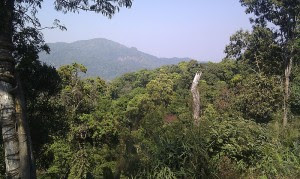Human rights organisations are expressing grave concerns over the fate of a prominent ethnic Karen activist who disappeared after reportedly being arrested on April 17 at Kaengkrachan National Park in Petchaburi province by Thai authorities.
 The New York based Human Rights Watch said it was concerned that Por Cha Lee Rakcharoen, also known as Billy, had been “forcibly disappeared.” HRW said that Thai authorities had not presented evidence of Billy’s release from arrest or the details of his detention, raising “grave concerns for his safety.”
The New York based Human Rights Watch said it was concerned that Por Cha Lee Rakcharoen, also known as Billy, had been “forcibly disappeared.” HRW said that Thai authorities had not presented evidence of Billy’s release from arrest or the details of his detention, raising “grave concerns for his safety.”
At the time of his disappearance, Billy had been involved in a lawsuit against park officials over the destruction of the homes of ethnic Karen living in the national park.
Brad Adams, Asia director at HRW, demanded a response from the Thai government. “The apparent disappearance of this prominent Karen activist demands an immediate government response,” he said, adding, “Thai authorities should not stay silent about Billy’s case but explain what happened to him.”
Billy had been reportedly travelling from his village in Petchaburi, Kaengkrachan district, to meet with ethnic Karen villagers to prepare for an upcoming lawsuit filed by the villagers against the head of Kaengkrachan National Park, the National Park, Wildlife and Plant Conservation Department, and the Ministry of Natural Resources and Environment, when he disappeared.
The head of the Kaengkrachan National Park Office, Chaiwat Limlikitaksor, reportedly told local activists on April 18 that Billy had been detained the day before at a checkpoint and taken into questioning for the alleged possession of illegal wild bee honeycomb and six bottles of honey. Chaiwat maintained that Billy had been released after being held for questioning and that he did not know Billy’s whereabouts.
“I didn’t think it was a big offence, so I just let him go. There were witnesses, people saw me release him,” Chaiwat is reported to have said in a Reuters interview.
The lawsuit concerns allegations that Thai authorities were behind the destruction and burning of property and homes of more than 20 ethnic Karen families living in the national park, in July 2011.
Billy had been preparing a petition to raise the case directly with His Majesty, King Bhumibol Adulyadej of Thailand. HRW said that he had been carrying documents related to the case at the time of his disappearance.
Villagers said that repeated attempts to get in touch with Billy had failed, leading to Billy’s family filing a formal complaint with the local police over his alleged forced disappearance.
A Park With A Murderous Past
Adding to concerns for Billy’s safety was the dubious history of activists engaged against the National Park authorities.
A Thai activist from Billy’s activist network had been shot and killed by unidentified gunmen on September 10, 2011. The activist, Tatkamol Ob-om, had been helping Karen villagers report alleged abuses, illegal logging, poaching, violence and other forms of corruption by park officials, when he was killed.
The murder of Tatkamol led to Phetchaburi’s provincial court accepting a case against Chaiwat, the head of the Kaengkrachan National Park Office, in January 2012, charging him with being the mastermind behind Tatkamol’s murder. HRW noted that while four alleged accomplices had so far been indicted for premeditated murder, Chaiwat had not been suspended from duty as required under disciplinary regulations regarding officials under criminal investigation.
“Chaiwat’s presence at the national park has been a cause of fear among local activists and villagers, particularly those involved in lawsuits against him.” HRW said, “Under international law, a government commits an enforced disappearance when state officials take a person into custody and then deny holding the person, or conceal or fail to disclose the person’s whereabouts.”
Mr. Adams concluded that the disappearance of Billy would forever mar the reputation of Thailand’s national parks as places to visit in safety.
“National parks should be a place to enjoy natural beauty and serene vistas, not a place for officials to abuse people,” Adams said. “So long as Billy’s whereabouts are unknown, a sense of fear will stalk the park communities demanding their rights.”



